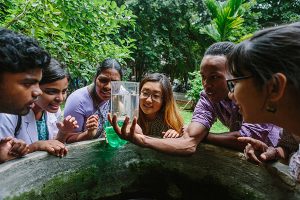International Travel
All travel outside of the United States for University purposes* by faculty, staff, graduate assistants, residents, fellows, and students must be registered in advance. Students must discuss self-identified travel plans (international activities not promoted by the university) with an appropriate education abroad office, University faculty and/or staff member prior to confirming travel plans. To familiarize yourself with definitions and student expectations while abroad, visit the Student Travel and Education Abroad: Health and Safety Policy.
Registry information is required, in part, so that University pre-travel assistance can be provided, as well as timely assistance in the event of an in-country crisis (e.g., military action, natural disaster). The University of Minnesota supports education abroad but must balance the educational value of participation in international activities with the potential risks to the welfare and safety of students.
Registry information is managed centrally through the Global Programs and Strategies Alliance, the central international office for the U of M system. There is one registry for students and a separate registry for faculty and staff, at the Travel Registry.
*Traveling for University purposes includes travel led by University faculty and staff; promoted by University faculty, staff, and units; funded by the University; or where credit is awarded or degree requirements are fulfilled. Examples include work, internships, field study, research, volunteering, conference or workshop attendance, athletic events, and Campus Life Program (CLP) activities abroad. Travel with a Registered Student Organization (RSO), that is not otherwise funded or supported by the University, and personal travel such as a vacation is NOT for University purposes.
Students
When you register, you will be asked to:
- Provide program or activity details.
- Document travel locations and dates.
- Identify a University 24-7 emergency contact and a personal emergency contact in the U.S. (names, phone numbers, and emails).
- Obtain University-approved international travel, health, and security insurance. You will need the EFS number and name of the budgetary contact in the unit, if your unit is paying for your CISI insurance coverage.
- Sign a release and waiver
- Complete health and safety orientation
Applied Practice Experience
If your international travel is associated with an Applied Practice Experience (APEX, formerly called Field Experience), the online Learning Agreement in the Field Experience Module will capture the relevant data from the GPSA Student Travel Registry and populate some of the required fields.
All students must complete the Learning Agreement before they begin their APEX. Information about APEX requirements, search strategies, and funding opportunities can be found under current student resources.
Faculty and Staff
When you register, you will be asked to provide:
- Location and dates of your travel
- Travel purpose(s) and emergency contact information
- EFS number and financial staff contact (if purchasing CISI international insurance)
SPH Emergency Contact
University policy requires everyone participating in University-purpose international travel or education abroad opportunity to provide a U.S. based 24/7 emergency contact in the office, unit or college supporting the student’s activity abroad. SPH students must identify an emergency contact in the School of Public Health (staff or faculty) before they register their travel through the University of Minnesota Global Programs and Strategy Alliance (GPSA). Students must request this directly from a faculty or staff. If a student is unable to identify an SPH emergency contact, then they and their advisor can contact Mercedes Taneja (estra021@umn.edu).
Emergency Protocols
In the event of an emergency, please follow this procedure. All University travelers are able to contact the University through the University’s international emergency phone number at 1-612-301-CALL (2255). Callers will be connected to the appropriate 24-7 University emergency contact person to assist with their emergency.

